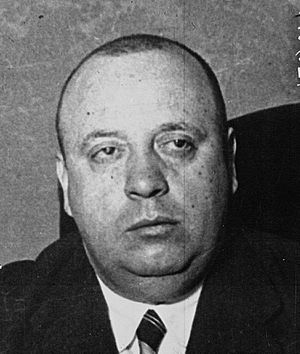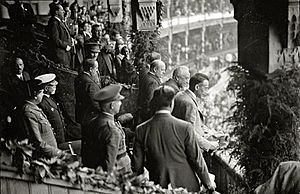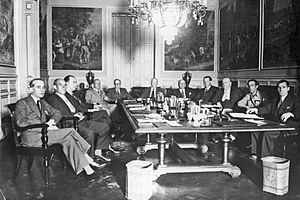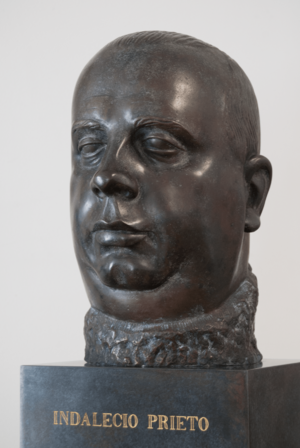Indalecio Prieto facts for kids
Quick facts for kids
Indalecio Prieto
|
|
|---|---|

Prieto in 1936
|
|
| Minister of Finance | |
| In office 14 April 1931 – 16 December 1931 |
|
| President | Manuel Azaña |
| Preceded by | Gabino Bugallal Araújo |
| Succeeded by | Jaime Carner |
| Minister of Public Works | |
| In office 16 December 1931 – 12 September 1933 |
|
| President | Manuel Azaña |
| Minister of the Navy and Air Force | |
| In office 4 September 1936 – 17 May 1937 |
|
| President | Francisco Largo Caballero |
| Minister of the National Defence | |
| In office 17 May 1937 – 5 April 1938 |
|
| President | Juan Negrín |
| President of the Spanish Socialist Workers' Party | |
| In office 1948–1951 |
|
| Preceded by | Enrique de Francisco |
| Succeeded by | Trifón Gómez |
| Personal details | |
| Born | 30 April 1883 Oviedo, Spain |
| Died | 11 February 1962 (aged 78) Mexico City, Mexico |
| Political party | PSOE |
| Signature | |
Indalecio Prieto Tuero (born April 30, 1883 – died February 11, 1962) was an important Spanish politician. He served as a minister and was a key leader of the Spanish Socialist Workers' Party (PSOE). He was active in the years leading up to and during the Second Spanish Republic.
Contents
Early Life and Career
Indalecio Prieto was born in Oviedo, Spain, in 1883. His father passed away when Indalecio was only six years old. In 1891, his mother moved them to Bilbao.
From a young age, Prieto worked hard to support himself. He started by selling magazines on the streets. Later, he got a job as a stenographer (someone who writes down spoken words quickly) at a newspaper called La Voz de Vizcaya.
This led to other roles, first as a copy editor and then as a journalist at another newspaper, El Liberal. Eventually, he became the director and even the owner of El Liberal.
In 1899, when he was just 16, Prieto joined the PSOE, a socialist political party. As a journalist in the early 1900s, he became a major voice for socialism in the Basque Country region of Spain.
Joining the Political Scene
Spain stayed neutral during World War I. This helped Spanish businesses, but workers' salaries did not improve much. This led to a lot of social unrest.
In August 1917, a big general strike happened. The government worried about similar events to the February Revolution in Russia. So, they used the military to stop the strike.
Prieto had helped organize the strike. To avoid arrest, he fled to France. He returned to Spain in April 1918 after being elected to the Spanish Congress of Deputies (like a parliament).
Speaking Out in Congress
Prieto was very critical of the government and army during the Rif War (1919–1926). After the Battle of Annual in 1921, he spoke strongly in Congress. He questioned the actions of General Manuel Fernández Silvestre and even suggested the king might be responsible for some military mistakes.
Prieto disagreed with Francisco Largo Caballero about working with the dictatorship of Miguel Primo de Rivera. He had many arguments with both men.
In August 1930, Prieto took part in the Pact of San Sebastián. This was a meeting of different political parties who wanted to end the Spanish monarchy. Prieto believed the monarchy needed to fall for socialism to gain power.
The Second Spanish Republic
The Second Spanish Republic was declared on April 14, 1931. Prieto was made finance minister in the first government, led by Niceto Alcalá-Zamora.

From 1931 to 1933, he served as Minister of Public Works under Manuel Azaña. He continued building hydroelectric projects (dams for electricity) that had started earlier. He also planned big improvements for Madrid, like a new train station and a tunnel connecting it to another station. Many of these projects were finished after the Spanish Civil War.
A Shift in Views
Unlike Largo Caballero, Prieto did not support the general strike and the uprising in October 1934. He fled to France again to avoid being arrested. Before the Republic, Prieto had been seen as more radical. But now, he became known as a more moderate politician. He often disagreed with Largo Caballero's more revolutionary ideas.
In May 1936, Prieto gave an important campaign speech in Cuenca. He asked for calm and discipline, warning against revolutionary actions that could harm the democratic government. He also showed strong patriotism, saying he carried Spain "within his heart." His speech was praised by many, but some radical groups in his own party did not like it.
During the Spanish Civil War
A few weeks after his speech, a sad event called the Modelo Massacre happened in Madrid. Prieto was very upset and felt pessimistic. He reportedly said, "with this brutality we have lost the war."
In September 1936, after the town of Talavera de la Reina fell to the rebel forces, Largo Caballero became the head of the government. Prieto was appointed Minister of Marine and Air.
After events in Barcelona in May 1937, where government forces tried to control some anarchist and communist groups, Largo Caballero's government was replaced. Juan Negrín became the new leader, and Prieto became Minister of Defense.
Challenges as Defense Minister
During this time, the Spanish Republic faced many challenges. Democratic countries like France, the United Kingdom, and the United States did not offer much support. This left Spain feeling very alone.
Ships bringing aid from the Soviet Union were attacked by Italian submarines. Also, the French border remained closed, making it hard to get supplies.
After the Republican forces lost battles in northern Spain in October 1937, Prieto offered to resign. His resignation was not accepted at first. However, after a major defeat on the Aragon front in March 1938, and growing disagreements with the communists, Prieto finally left the government.
Life in Exile
Prieto did not take an active political role for the rest of the war. He went into exile in Mexico. In 1945, near the end of World War II, he tried to form a government-in-exile. He hoped to work with those who opposed Francisco Franco, who ruled Spain after the Civil War. His goal was to bring democracy back to Spain.
This effort did not succeed, and Prieto then retired from active politics. He passed away in Mexico City in 1962.
While in Mexico, he wrote several books. These include Palabras al viento (Words in the Wind, 1942), Discursos en América (Discourses in America, 1944), and Cartas a un escultor: pequeños detalles de grandes sucesos (Letters to a Sculptor: Small Details of Great Events, 1962).
Political Views
Prieto supported giving more power to the Basque Provinces and Navarra regions. However, he was strongly against separatism (regions breaking away from Spain). He worried that the plans of the Basque nationalists might turn the territory into a "reactionary Gibraltar" and a place controlled by the church.
See also
 In Spanish: Indalecio Prieto para niños
In Spanish: Indalecio Prieto para niños
- Spanish Republican Army
 | Precious Adams |
 | Lauren Anderson |
 | Janet Collins |



